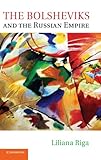The Bolsheviks and the Russian Empire / Liliana Riga.
Material type: TextPublisher: Cambridge : Cambridge University Press, 2012Description: xiii, 313 pages ; 24 cmContent type:
TextPublisher: Cambridge : Cambridge University Press, 2012Description: xiii, 313 pages ; 24 cmContent type: - text
- unmediated
- volume
- 9781107014220
- Unión Soviética -- Política y gobierno -- 1917-1936
- Comunismo -- Unión Soviética -- Historia
- Revolucionarios -- Unión Soviética -- Historia
- Soviet Union -- Politics and government -- 1917-1936
- Communism -- Soviet Union -- History
- Revolutionaries -- Soviet Union -- History
- Radicals -- Soviet Union -- History
- Minorities -- Political activity -- Soviet Union -- History
- Ethnicity -- Political aspects -- Soviet Union -- History
- Assimilation (Sociology) -- Political aspects -- Soviet Union -- History
- Marginality, Social -- Political aspects -- Soviet Union -- History
- Social classes -- Soviet Union -- History
- Soviet Union -- Social conditions -- 1917-1945
- SOCIAL SCIENCE / Sociology / General
- 324.247/0750922
- 338 DK 266.5 R565b 2012
- SOC026000
| Item type | Current library | Home library | Collection | Shelving location | Call number | Vol info | Copy number | Status | Date due | Barcode |
|---|---|---|---|---|---|---|---|---|---|---|
 Libro
Libro
|
Biblioteca Juan Bosch | Biblioteca Juan Bosch | Recursos Regionales | Recursos Regionales (2do. Piso) | 338 DK 266.5 R565b 2012 (Browse shelf(Opens below)) | 1 | 1 | Available | 00000111860 |
"This comparative historical sociology of the Bolshevik revolutionaries offers a reinterpretation of political radicalization in the last years of the Russian Empire. Finding that two-thirds of the Bolshevik leadership were ethnic minorities - Ukrainians, Latvians, Georgians, Jews and others - this book examines the shared experiences of assimilation and socioethnic exclusion that underlay their class universalism. It suggests that imperial policies toward the Empire's diversity radicalized class and ethnicity as intersectional experiences, creating an assimilated but excluded elite: lower-class Russians and middle-class minorities universalized particular exclusions as they disproportionately sustained the economic and political burdens of maintaining the multiethnic Russian Empire. The Bolsheviks' social identities and routes to revolutionary radicalism show especially how a class-universalist politics was appealing to those seeking secularism in response to religious tensions, a universalist politics where ethnic and geopolitical insecurities were exclusionary, and a tolerant 'imperial' imaginary where Russification and illiberal repressions were most keenly felt"-- Provided by publisher.
Includes bibliographical references (pages 283-301) and indexes.
Machine generated contents note: Part I. Identity and Empire: 1. Reconceptualizing Bolshevism; 2. Social identities and imperial rule; Part II. Imperial Strategies and Routes to Radicalism in Contexts: 3. The Jewish Bolsheviks; 4. The Polish and Lithuanian Bolsheviks; 5. The Ukrainian Bolsheviks; 6. The Latvian Bolsheviks; 7. The South Caucasian Bolsheviks; 8. The Russian Bolsheviks.


There are no comments on this title.